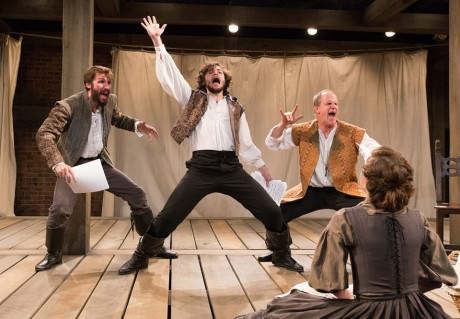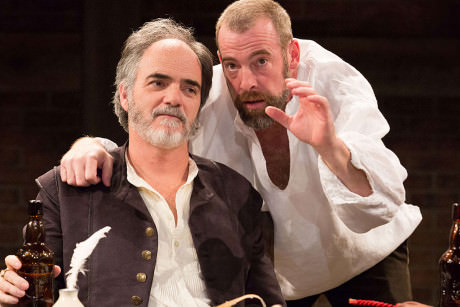Equivocation, Bill Cain’s alternative history about William Shakespeare getting caught up in deadly royal court intrigue, is exceedingly clever and almost dizzyingly erudite. And it has some quite funny moments early on. But it soon turns dark and depressing, focusing on a historical event that’s bleak and, to many Americans, obscure. And with a running time of nearly three hours, Director Terrence J. Nolen’s production eventually becomes tedious.

Equivocation opens with Shakespeare – called “Shag” here, short for the alternative spelling “Shagspeare” – summoned to a meeting with Sir Robert Cecil, the cold and calculating Prime Minister for King James I. Cecil wants Shakespeare to write a play telling the “true history” of the Gunpowder Plot, the infamous 1605 conspiracy by a group of Catholic noblemen to blow up the Houses of Parliament and overthrow the government. Shag reluctantly agrees, postponing work on his new play King Lear to get the work done. But the more Shag writes, the more he questions the official government story. (Where did all that gunpowder come from, anyway – and where did it go afterwards? And if the plotters spent months digging a tunnel under Parliament, where did all the dirt go?) Before long Shag is sneaking into jail to interview the accused, wrangling with Cecil, and putting his own life at risk.
Challenging the historical record isn’t a bad idea; Josephine Tey’s The Daughter of Time, which upends Shakespeare’s account of Richard III, shows that an alternative view of history can make for exhilarating and thoughtful storytelling. But in this case, after Shag’s actors repeatedly tell him that the Gunpowder Plot is not workable dramatically, we come to realize that they’re right. And since we know that Shakespeare never wrote a play about the Plot, we know this isn’t going to end successfully. When the play causes a rift in his Globe Theatre acting troupe, it’s an unnecessary complication that prolongs the play too much and is hard to care about.
An extended discussion of the ethical justification of equivocation – lying, or telling the truth in an ambiguous way, to achieve a good moral result – is interesting from a philosophical viewpoint but dramatically inert. (A critique of the royal government for lying about whether it tortures people – a veiled reference to Guantanamo – is more intriguing.) Cain also points out similarities between the major players of the Gunpowder Plot and characters in Shakespeare’s plays, but you might not understand his points unless you’ve brushed up your Shakespeare – and your Jacobean history. And all these themes get in the way of Cain’s exploration of Shag’s conflicted relationship with his daughter Judith, a dramatically rich subject (with a welcome female voice) that doesn’t get the attention it deserves.
Cain’s play is marked by its scholarship (you’ll learn more about the Gunpowder Plot than you ever wanted to know) and witty commentary (one of the play’s best moments is an ironic soliloquy by Judith that criticizes soliloquies). But Cain’s use of modern vernacular dialogue is problematic: the Shakespeare who wrote some of the most beautiful lines in the English language (some of which are quoted) seems miles away from the vocabulary-starved journeyman we see here, one who dismisses Cecil with a curt “He’s insane!” (Shakespeare doesn’t even get the best lines – quips like “Politics is religion for people who think they’re God” are given to other characters.) Director Nolen’s decision to have the actors use their natural American accents doesn’t help with authenticity; only King James, ever the Scottish outsider, is given a genuine-sounding accent.

But Nolen does keep the play moving quickly. He also keeps the action clear at all times in a play that, with actors playing multiple roles and settings changing in mid-scene, could be hard to follow. Eric Hissom is good as Shag, though the character as written is so weary and colorless that he’s hard to be interested in. Dan Hodge is a blast as the merciless and demanding Cecil, and Campbell O’Hare is solemn and sympathetic as Judith. Sean Lally is a randy King James, a ravaged prisoner, and an ambitious young actor in Shag’s troupe; Anthony Lawton is the plot’s ringleader and a prosecutor flummoxed by the Jesuit Henry Garnet; and Ian Merrill Peakes plays both Garnet and the Shakespearean star Richard Burbage. (One of the highlights of this production is an extended excerpt from Macbeth that allows Peakes, who played Macbeth so well at the Arden this past Spring, to return briefly to the role.)
David P. Gordon’s scenic design sets Equivocation on an unadorned wooden platform of the Globe actors’ rehearsal room, surrounded by bare brick walls that don’t distract from the action. Solomon Weisbard’s lighting and Jorge Cousineau’s sound, with good use of echo, allow for scene changes with a minimum of fuss. Rosemarie E. McKelvey’s costumes have a credible appearance without being too fanciful.
Running Time: Two hours and 50 minutes, including an intermission.
Equivocation plays through December 13, 2015 on the Arcadia Stage at the Arden Theatre -40 North Second Street, in Philadelphia, PA. For tickets, call the box office at (215) 922-1122, or purchase them online.




